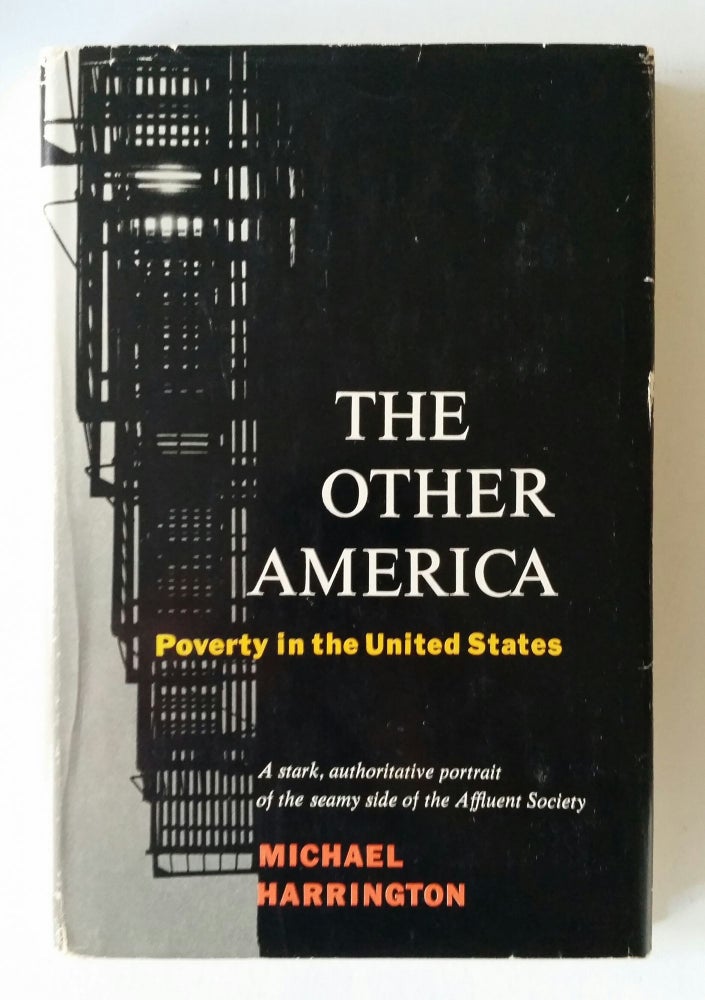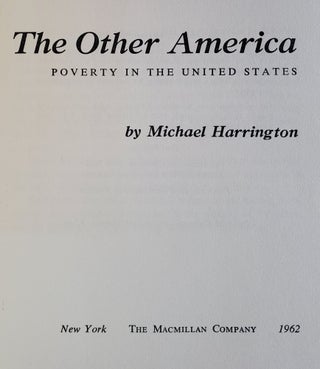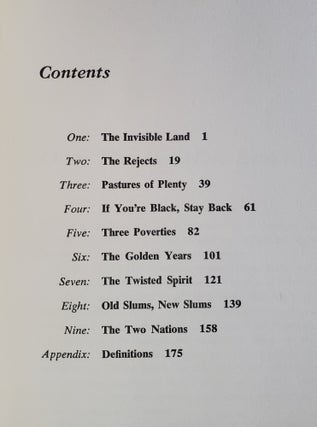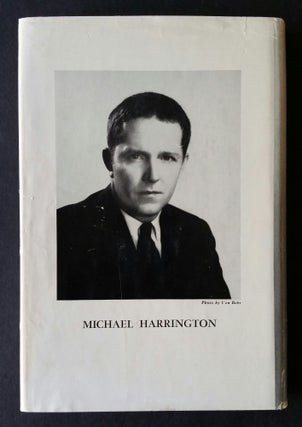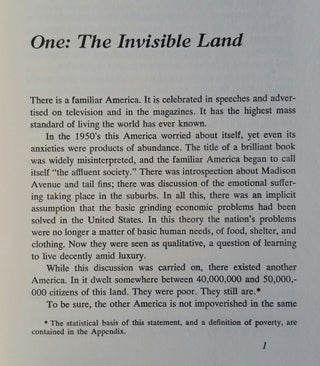The Other America; Poverty in the United States
New York: The Macmillan Company, 1962. First edition. Octavo, original pale grey cloth lettered in yellow, original dust jacket. Book fine, gentle edge-wear, neat tape reinforcement to verso folds of price-clipped dust jacket. Still, a bright, clean, very good indeed copy. Item #1169
"POVERTY IN AMERICA FORMS A CULTURE, A WAY OF LIFE AND FEELING"
First edition of The Other America—Michael Harrington's early study of the culture of "the new poverty" in the middle of post-war American affluence—complete in the original dust jacket. The Other American sold over 125,000 copies by 1965 and became a touchstone in the developing "War on Poverty" during the second Johnson administration.
As a child of the middle class, Michael Harrington was an unlikely "tribune of the poor." But his own identity as an "'Other American' drew on a number of sources in his experience growing up. It drew, first of all, on his Catholicism. He grew up in the Church, served as an altar boy, was educated in its schools, at a time when the Church still felt itself excluded from, embattled with, and wary of the appeals of the dominant modernist/materialist culture. In 1940 Harrington enrolled in the Jesuit St. Louis University high school. A line in Harrington's 1942 yearbook captures the spirit in which his teachers set about their enterprise, declaring that the most important benefit of a Jesuit education for its graduates was that it instilled them 'with the necessary fortitude and enthusiasm to step forth into battlefield, college or workaday world, and strive towards the urgent conversion of a perverted, pagan universe.'" (Maurice Isserman). Student interest in neo-Thomism and Catholic Social Teaching led Harrington to join the Catholic Worker in 1951 where he was an editor of the newspaper. But by the late 1950's "Mike Harrington was no longer" with the Catholic Worker (or the Church), as Dorothy Day's own biographer tells us, "presumably because he did not believe that the human search found its end in the Church but in some form of social organization" (William D. Miller). "Michael left the Church as a young man, but as he was the first to acknowledge, he never shed its influence" (Isserman).
The Acknowledgements recognize a substantial debt to Dorothy Day ("It was through Dorothy Day and the Catholic Worker movement that I first came into contact with the terrible reality of involuntary poverty and the magnificent ideal of voluntary poverty") and concludes with a warm dedication to Harrington's parents: "I would dedicate this volume to the memory of my mother, from whom I first learned of justice; and to the memory of my father, that his gentleness will become the principle of the world." Harrington mixed reporting and analysis to demonstrate the continued existence of poverty: "I have been guided by two principles: to be as honest and objective as possible about the figures; to speak emotionally in the name of common humanity of those who dwell in the culture of poverty." Harrington's description of the "new poverty" laid bare the often invisible chasm between two very different nations. The Other America was an inspiration for the Great Society's call for a "War on Poverty," arguing for an integrated and comprehensive attack led by the Federal government.
Harrington's political evolution led him to later distance himself from the Catholic Worker and the book "that always made him cringe. Harrington was introduced as the author of The Other America, 'the book that launched the war on poverty.' He gently reintroduced himself: 'I’ve written several other books that might interest you.' His other books were important to him, and he hoped they were better than The Other America, a puffed-up version of a journalistic article he wrote on the run during his Greyhound Bus years" (Gary Dorrien). There is no bibliography or index but the text is supplemented with an Appendix: Definitions, a discussion of the widely differing interpretations of the statistics and metrics used to analyze involuntary poverty. Dust jacket designed by Ursula Suess. A bright, clean copy. Miller, Dorothy Day: A Biography. Dorrien, American Democratic Socialism: History, Politics, Religion, and Theory. Isserman, Michael Harrington: An "Other American'' (Sacred Heart University Review).
Price: $600.00

